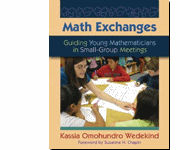3 ways to reduce math anxiety  | | (Getty Images/NewsCred) | Focusing on how educators teach can help reduce math anxiety, according to researchers Sian L. Beilock of the University of Chicago and Daniel T. Willingham of the University of Virginia. This blog post highlights three recommendations made by the researchers in a recent issue of American Educator. Other suggestions include phasing out timed tests and giving appropriate feedback to struggling students. Education Week (tiered subscription model)/Curriculum Matters blog (6/10)
How entrepreneurship, projects can combine for meaningful lessons The success of project-based learning depends on whether students find the work meaningful, high-school teacher Raleigh Werberger writes in this blog post. Werberger describes a lesson plan that combined project-based learning strategies and entrepreneurship -- creating meaningful lessons with real-world potential and high stakes for students. Werberger writes that students were asked to create business models, presented to business leaders in a Shark Tank-like event, in which one project was funded. Edutopia.org/Raleigh Werberger's blog (6/9) The success of project-based learning depends on whether students find the work meaningful, high-school teacher Raleigh Werberger writes in this blog post. Werberger describes a lesson plan that combined project-based learning strategies and entrepreneurship -- creating meaningful lessons with real-world potential and high stakes for students. Werberger writes that students were asked to create business models, presented to business leaders in a Shark Tank-like event, in which one project was funded. Edutopia.org/Raleigh Werberger's blog (6/9)
Other News  | Drexel University's Online M.S. & Cert. in Mathematics Learning and Teaching Designed to provide teachers with the preparation needed to help students reason through mathematical challenges with an analytical multiple-solution approach. It provides teachers with the disposition, skills and breadth of expertise needed to implement problem-based and technology-intensive instruction that is student-centered. Learn more now. | | | | | Iowa middle school to try PBL for core subjects An Iowa middle school this autumn will test a project-based learning curriculum that will teach core subjects through individual and group projects. Ninety eighth-graders will spend five periods a day among three teachers. "I hope that this program is the right venue to unlock the innovation, creativity, and critical thinking skills that our students possess -- never underestimate the power of a middle-schooler," principal Autumn Pino wrote in an e-mail. The Gazette (Cedar Rapids-Marion, Iowa) (6/9) |  | Do you address the SIX areas of reading instruction?
Get FREE overview documents detailing the definitions and the role of phonological awareness, phonics, structural analysis, fluency, vocabulary and comprehension in learning to read and spell. Learn more about Lexia's instructional approach in these key areas and how we help teachers change the future for their students. |
|
 | | Other News |  |
"Provides a clear picture of various ways to set up math workshop in the primary grades" (Snapshots of Mrs. V). Math Exchanges shows you how to foster rich small-group discussions and help students construct new meaning and understanding as they establish themselves as mathematicians. Preview Chapter 1: Creating Space for Math Workshop. |
|
 | Should STEM actually be CEMS? With data showing that 71% of all future science, technology, engineering and math jobs will be "computer occupations," there is an increasing emphasis on teaching computer skills in schools, Evan Charles, founder of Launch Academy, writes in this commentary. "Perhaps it's time we start thinking of future workforce opportunities -- and our corresponding investments -- in terms of C for computers and then E, M and S for engineering, math and science. 'CEMS' isn't as pretty an acronym, but it's a lot more accurate," Charles writes. U.S. News & World Report (6/5) With data showing that 71% of all future science, technology, engineering and math jobs will be "computer occupations," there is an increasing emphasis on teaching computer skills in schools, Evan Charles, founder of Launch Academy, writes in this commentary. "Perhaps it's time we start thinking of future workforce opportunities -- and our corresponding investments -- in terms of C for computers and then E, M and S for engineering, math and science. 'CEMS' isn't as pretty an acronym, but it's a lot more accurate," Charles writes. U.S. News & World Report (6/5)
|  | I don't believe in luck -- I believe in preparation." -- Bobby Knight, American basketball coach | | | | Math Education SmartBrief is an aggregation of published news and editorial content from diverse sources. The content of Math Education SmartBrief does not necessarily reflect the position or editorial viewpoint of any particular organization. | Please contact one of our specialists for advertising opportunities, editorial inquiries, job placements, or any other questions.
| Mailing Address:
SmartBrief, Inc.®, 555 11th ST NW, Suite 600, Washington, DC 20004 | | |


No comments:
Post a Comment